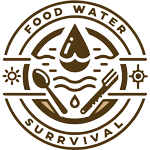Top Survival Food Rationing Tips: Take Our Quiz
As the cornerstone of your survival shelter, your pantry's contents could mean the difference between resilience and vulnerability. You've meticulously stored grains, canned goods, and dehydrated meals, but do you know how to make these provisions last when every calorie counts?
It's time to put your knowledge to the test. With our practical quiz, you'll discover whether you've got the chops to ration like a pro or if your strategies might leave you hungry for more insight. Consider the implications of your current food management plan and prepare to uncover a few tactics that could significantly stretch your survival cache.
Are you ready to evaluate your readiness and refine your rationing skills?
Assessing Your Food Inventory
Assessing your food inventory is crucial; start by tallying up your non-perishable items to gauge what's at hand. You'll want to know not just the quantity, but also the variety of your pantry staples. Check the shelf life of these items to ensure they'll last for several months, especially since emergency food must sustain without refrigeration.
Mind the calories per person in your household, aiming for a sufficient daily intake. Remember, an average adult needs about 2,000 calories per day, but this can vary based on activity level and dietary restrictions. Ensure you have a balance of proteins, carbohydrates, and fats to maintain a healthy diet.
Scrutinize your food storage for signs of spoilage or past expiration dates, as consuming spoiled food can lead to health issues. It's not just about having enough—it's about having the right kind of nutritionally dense food to see you through an emergency.
Lastly, don't forget to include essentials like water, salt, and pepper. These items are often overlooked but are vital for both hydration and making your food palatable.
Calculating Daily Caloric Needs
To accurately gauge your daily caloric needs, consider factors like age, gender, weight, height, and your level of physical activity. A calorie calculator can help you pinpoint the number of calories a day you'll need for survival. When planning ahead, remember that these needs can fluctuate based on your environment and the tasks at hand.
You'll want to ensure you've got enough food that's not only calorie-dense but also nutritionally balanced. The best survival strategy is to include a variety of proteins, carbohydrates, and fats, as well as essential vitamins and minerals. For instance, freeze-dried foods often have a convenient add water option, making them a practical choice for their lightweight and easy-to-prepare nature.
Keep in mind that it's not just about the amounts of food but also about having one gallon per person per day of water to maintain hydration. As you monitor your intake, adjust your rations to maintain sufficient energy levels. Remember, the goal is to consume enough calories per person per day to stay healthy and alert, without overindulging or depleting your resources too quickly.
Good planning and smart rationing are key to managing your daily caloric needs effectively.
Prioritizing Nutrient-Dense Foods
When facing an emergency, it's crucial to stock your survival kit with nutrient-dense foods to ensure your diet remains rich in essential nutrients and calories. The best food for such situations isn't just about filling your belly; it's about keeping your body fueled with everything it needs to stay healthy and alert.
Here are some top picks to consider:
- Food Bars: Compact and packed with calories, these are a great source of energy and often contain lots of vitamins and minerals.
- Mountain House Meals: Just add water to these freeze-dried meals for a quick, nutrient-dense dish that's surprisingly tasty.
- Canned Goods: Options like beans, vegetables, and fruits are pantry items that provide essential fiber, vitamin C, and other nutrients.
Stretching Your Food Supply
Maximize your food reserves by planning and preparing meals that leverage the most nutrient-dense and long-lasting items from your emergency stash. When stretching your food supply, especially during a power outage or extended periods of isolation, it's vital to keep in mind the balance of calories and nutrients.
Your survival kits should contain days' worth of food stores that don't require a lot of cook time, such as canned vegetables, beans, and proteins.
Make sure you're talking about food that gives you a lot of calories and sustenance to maintain your energy levels. This means prioritizing foods like whole grains, nuts, and trail mixes—items that aren't only filling but also packed with nutrients.
These snacks are particularly useful because they're high-energy and convenient, perfect for when you need a quick boost without the luxury of cooking.
Preserving Food Safely
Having discussed how to stretch your food supply, let's explore how you can preserve that supply safely to ensure it lasts even longer. In survival situations, having enough to keep you and your loved ones fed for a long time is crucial. Here's how to make sure your food preservation is up to par:
- Proper Canning: Learn and follow proper canning procedures to avoid spoilage and foodborne illnesses.
- Dehydrating Food: Use a dehydrator to dry out fruits, vegetables, and meats, which can be stored for months.
- Vacuum Sealing: This method removes air from packaging, extending the shelf life of your food.
When preserving food safely, it's essential to keep cleanliness at the forefront. Always boil water before using it to clean containers and utensils to kill any bacteria. This is crucial for the best emergency food preparation. Make sure to also use boiling water when canning to ensure the food is sterile.
Conclusion
You've got the basics down for managing your food in a crisis. Remember to keep track of your supplies, calculate your caloric needs accurately, focus on nutrient-rich foods, and make every meal count.
Safely preserve what you can to extend your food's shelf life. With these tips, you're better prepared to stay nourished and energized when it matters most.
Don't forget to test your knowledge with our quiz and stay ready for whatever comes your way!
